语法知识—动词时态的知识点总复习含解析
2021年初中英语语法知识—动词时态的知识点总复习含答案(2)
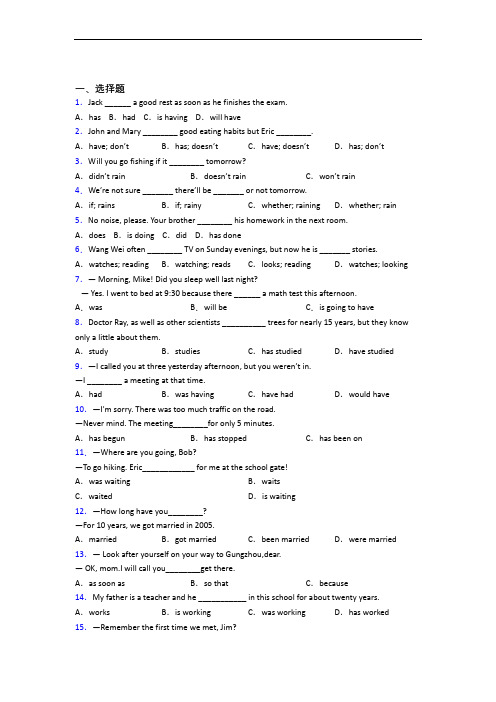
一、选择题1.Jack ______ a good rest as soon as he finishes the exam.A.has B.had C.is having D.will have2.John and Mary ________ good eating habits but Eric ________.A.have; don’t B.has; doesn’t C.have; doesn’t D.has; don’t 3.Will you go fishing if it ________ tomorrow?A.didn’t rain B.doesn’t rain C.won’t rain4.We’re not sure _______ there’ll be _______ or not tomorrow.A.if; rains B.if; rainy C.whether; raining D.whether; rain 5.No noise, please. Your brother ________ his homework in the next room.A.does B.is doing C.did D.has done6.Wang Wei often ________ TV on Sunday evenings, but now he is _______ stories. A.watches; reading B.watching; reads C.looks; reading D.watches; looking 7.— Morning, Mike! Did you sleep well last night?— Yes. I went to bed at 9:30 because there ______ a math test this afternoon.A.was B.will be C.is going to have 8.Doctor Ray, as well as other scientists __________ trees for nearly 15 years, but they know only a little about them.A.study B.studies C.has studied D.have studied 9.—I called you at three yesterday afternoon, but you weren’t in.—I ________ a meeting at that time.A.had B.was having C.have had D.would have 10.—I'm sorry. There was too much traffic on the road.—Never mind. The meeting________for only 5 minutes.A.has begun B.has stopped C.has been on 11.—Where are you going, Bob?—To go hiking. Eric____________ for me at the school gate!A.was waiting B.waitsC.waited D.is waiting12.—How long have you________?—For 10 years, we got married in 2005.A.married B.got married C.been married D.were married 13.— Look after yourself on your way to Gungzhou,dear.— OK, mom.I will call you________get there.A.as soon as B.so that C.because14.My father is a teacher and he ___________ in this school for about twenty years. A.works B.is working C.was working D.has worked 15.—Remember the first time we met, Jim?—Of course I do. You ________ in the library.A.were reading B.have read C.will read D.read16.The water ______ cool when I jumped into the pool for morning exercise.A.was felt B.is felt C.felt D.feels17.---Where have you been recently?---I _______ in Hangzhou on business for a week last month.A.have been B.had gone C.had been D.was18.Can you describe ________?A.what the student look like B.what does the student look likeC.what does the student looks like D.what the student looks like19.Mr. Smith ______ our school next year.A.will visit B.visits C.was visiting D.visited20.—How did the accident happen?—You know, it was difficult to see the road clearly because it________.A.was raining B.has rained C.is raining D.will rain 21.Sandy likes ________ TV. She ________ TV every day.A.watching; watching B.watch; watchesC.to watch; is watching D.watching; watches22.Could you please turn down your music? I________.A.work B.works C.am working D.worked23.My father was reading ________ I was sleeping.A.while B.when C.before D.after24.—Do you still play the piano?—Oh, no. I ________it since last year.A.didn’t play B.haven’t played C.don’t play25.—How much is the ticket (票) to Central Park?—One ticket $40, and you can $80 for two persons.A.costs; pay B.cost; spend C.pay; spend D.spends; pay【参考答案】***试卷处理标记,请不要删除一、选择题1.D解析:D【解析】句意:Jack一完成他的考试就要好好的休息一下。
动词时态和被动语态用法详细全面归纳总结
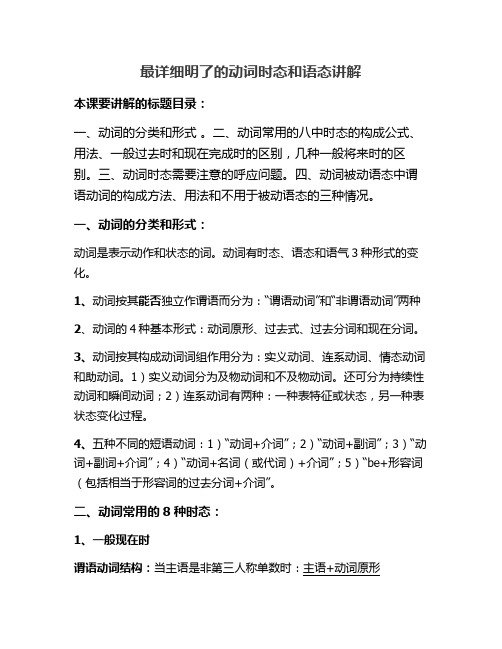
最详细明了的动词时态和语态讲解本课要讲解的标题目录:一、动词的分类和形式。
二、动词常用的八中时态的构成公式、用法、一般过去时和现在完成时的区别,几种一般将来时的区别。
三、动词时态需要注意的呼应问题。
四、动词被动语态中谓语动词的构成方法、用法和不用于被动语态的三种情况。
一、动词的分类和形式:动词是表示动作和状态的词。
动词有时态、语态和语气3种形式的变化。
1、动词按其能否独立作谓语而分为:“谓语动词”和“非谓语动词”两种2、动词的4种基本形式:动词原形、过去式、过去分词和现在分词。
3、动词按其构成动词词组作用分为:实义动词、连系动词、情态动词和助动词。
1)实义动词分为及物动词和不及物动词。
还可分为持续性动词和瞬间动词;2)连系动词有两种:一种表特征或状态,另一种表状态变化过程。
4、五种不同的短语动词:1)“动词+介词”;2)“动词+副词”;3)“动词+副词+介词”;4)“动词+名词(或代词)+介词”;5)“be+形容词(包括相当于形容词的过去分词+介词”。
二、动词常用的8种时态:1、一般现在时谓语动词结构:当主语是非第三人称单数时:主语+动词原形当主语是第三人称单数时:主语+动词的第三人称单数形式(动词的词尾要加-S)(规则:一般的动词词尾+S.以sh/ch/s/x结尾的词+es.以辅音字母Y结尾的把Y变成i,+es.辅音字母+o结尾的+es.) 。
一般现在时的用法:1)表示现在的习惯,经常发生的动作或存在的状态。
如:I often get up early in the morning .He likes reading in the afternoon.2)表示客观事实或真理及自然现象,此用法即使出现在过去语境中,也用一般现在时态。
如:The sun rises in the east.3)用于here,there开头的倒装句中,一般现在时表示正在发生的动作或存在的状态。
如:There goes the bell. Here comes the bus.2、一般过去时态谓语动词构成:主语+动词的过去式动词的过去式是在动词原形的基础上变化而来的,一般是在词尾加上ed.动词的过去式可分为规则动词和不规则动词.规则动词的过去式变化如下:一般情况下,动词词尾加 -ed ,如: work-ed, play-ed ,want-ed. Act-ed 等词。
动词的时态和语态全析全解

动词的时态和语态全析全解动词时态(tense)是一种动词形式,不同的时态用以表示不同时间里所产生的动作或存在的状态。
从种类上看英语有16种时态,而其中常用的有11种,表中斜体字表示的时态不常用。
动词各时态名称如下:1-4 现在:一般现在时现在进行时现在完成时现在完成进行时2-4 过去:一般过去时过去进行时过去完成时过去完成进行时3-4 将来:一般将来时将来进行时将来完成时将来完成进行时4-4 过去将来:一般过去将来时过去将来进行时过去将来完成时过去将来完成进行时各时态的英语表达结构(以write为例):一般/进行/完成/完成进行1、现在write, writesam/is/are writinghave/has writtenhave/has been writing2、过去wrotewas/were writinghad writtenhad been writing3、将来shall/will writeshall/will be writingshall/will have writtenshall/will have been writing4、过去将来should/would writeshould/would be writingshould/would have writtenshould/would have been writing各时态用法说明一. 一般现在时一般现在时主要由动词原形表示,但第三人称单数作主语时谓语动词后要加-s或-es,另外,be和have有特殊的人称形式。
如:1.一般动词:I know it.You know it.He/She knows it.We/You/They know it.2. 动词be:以am, is, are三种形式出现。
I am a teacher.You are a student.He / She is a student.We/You/They are students.3. 动词have:以have, has形式出现。
2024高考英语语法知识点归纳总结动词的时态和语态
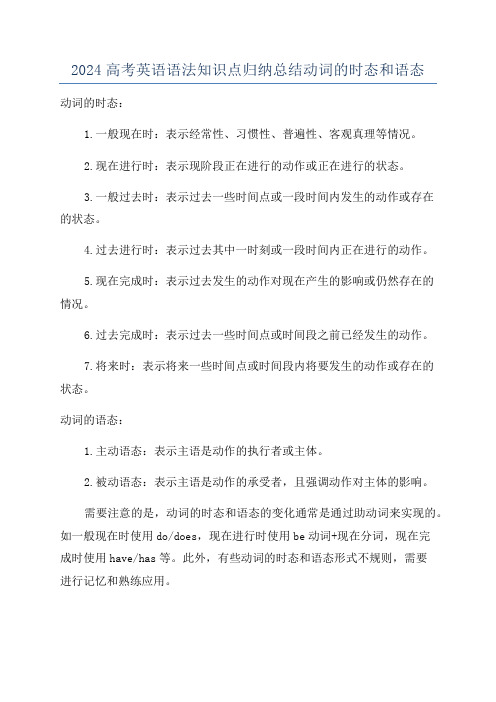
2024高考英语语法知识点归纳总结动词的时态和语态
动词的时态:
1.一般现在时:表示经常性、习惯性、普遍性、客观真理等情况。
2.现在进行时:表示现阶段正在进行的动作或正在进行的状态。
3.一般过去时:表示过去一些时间点或一段时间内发生的动作或存在
的状态。
4.过去进行时:表示过去其中一时刻或一段时间内正在进行的动作。
5.现在完成时:表示过去发生的动作对现在产生的影响或仍然存在的
情况。
6.过去完成时:表示过去一些时间点或时间段之前已经发生的动作。
7.将来时:表示将来一些时间点或时间段内将要发生的动作或存在的
状态。
动词的语态:
1.主动语态:表示主语是动作的执行者或主体。
2.被动语态:表示主语是动作的承受者,且强调动作对主体的影响。
需要注意的是,动词的时态和语态的变化通常是通过助动词来实现的。
如一般现在时使用do/does,现在进行时使用be动词+现在分词,现在完
成时使用have/has等。
此外,有些动词的时态和语态形式不规则,需要
进行记忆和熟练应用。
《常考题》七年级上英语常用语法知识——动词时态知识点复习(含答案解析)
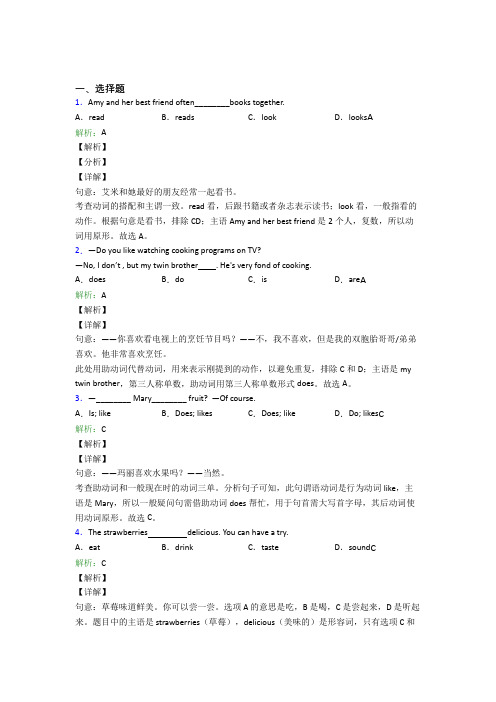
一、选择题1.Amy and her best friend often________books together.A.read B.reads C.look D.looks A解析:A【解析】【分析】【详解】句意:艾米和她最好的朋友经常一起看书。
考查动词的搭配和主谓一致。
read看,后跟书籍或者杂志表示读书;look看,一般指看的动作。
根据句意是看书,排除CD;主语Amy and her best friend是2个人,复数,所以动词用原形。
故选A。
2.—Do you like watching cooking programs on TV?—No, I don’t , but my twin brother . He's very fond of cooking.A.does B.do C.is D.are A解析:A【解析】【详解】句意:——你喜欢看电视上的烹饪节目吗?——不,我不喜欢,但是我的双胞胎哥哥/弟弟喜欢。
他非常喜欢烹饪。
此处用助动词代替动词,用来表示刚提到的动作,以避免重复,排除C和D;主语是my twin brother,第三人称单数,助动词用第三人称单数形式does。
故选A。
3.—________ Mary________ fruit? —Of course.A.Is; like B.Does; likes C.Does; like D.Do; likes C解析:C【解析】【详解】句意:——玛丽喜欢水果吗?——当然。
考查助动词和一般现在时的动词三单。
分析句子可知,此句谓语动词是行为动词like,主语是Mary,所以一般疑问句需借助动词does帮忙,用于句首需大写首字母,其后动词使用动词原形。
故选C。
4.The strawberries delicious. You can have a try.A.eat B.drink C.taste D.sound C解析:C【解析】【详解】句意:草莓味道鲜美。
英语语法 动词时态和语态 详解
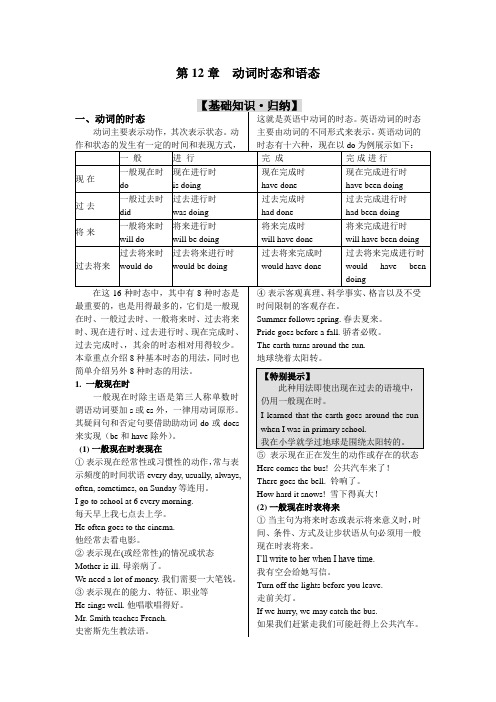
第 12 章动词时态和语态【基础知识·归纳】一、动词的时态动词主要表示动作,其次表示状态。
动 作和状态的发生有一定的时间和表现方式, 一 般 现在 过去 将来 一般现在时 do 一般过去时 did 一般将来时 will do 过去将来时 would do 进 行 现在进行时 is doing 过去进行时 was doing 将来进行时 will be doing 过去将来进行时 would be doing 这就是英语中动词的时态。
英语动词的时态 主要由动词的不同形式来表示。
英语动词的 时态有十六种,现在以 do 为例展示如下: 完 成 现在完成时 have done 过去完成时 had done 将来完成时 will have done 过去将来完成时 would have done 完成进行 现在完成进行时 have been doing 过去完成进行时 had been doing 将来完成进行时 will have been doing 过去将来完成进行时 would have been doing过去将来在这 16 种时态中,其中有 8 种时态是 最重要的,也是用得最多的,它们是一般现 在时、一般过去时、一般将来时、过去将来 时、 现在进行时、 过去进行时、 现在完成时、 过去完成时、 ,其余的时态相对用得较少。
本章重点介绍 8 种基本时态的用法, 同时也 简单介绍另外 8 种时态的用法。
1. 一般现在时 一般现在时除主语是第三人称单数时 谓语动词要加 s 或 es 外,一律用动词原形。
其疑问句和否定句要借助助动词 do 或 does 来实现(be 和 have 除外) 。
(1) 一般现在时表现在 ① 表示现在经常性或习惯性的动作, 常与表 示频度的时间状语 every day, usually, always, often, sometimes, on Sunday 等连用。
初中英语语法:动词时态讲解及练习
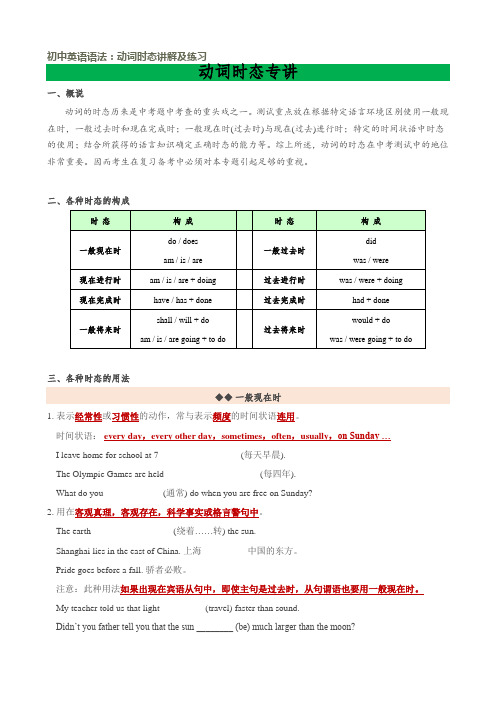
初中英语语法:动词时态讲解及练习动词时态专讲一、概说动词的时态历来是中考题中考查的重头戏之一。
测试重点放在根据特定语言环境区别使用一般现在时,一般过去时和现在完成时;一般现在时(过去时)与现在(过去)进行时;特定的时间状语中时态的使用;结合所获得的语言知识确定正确时态的能力等。
综上所述,动词的时态在中考测试中的地位非常重要。
因而考生在复习备考中必须对本专题引起足够的重视。
二、各种时态的构成三、各种时态的用法◆◆一般现在时1. 表示经常性或习惯性的动作,常与表示频度的时间状语连用。
时间状语:every day,every other day,sometimes,often,usually,on Sunday …I leave home for school at 7 _________________ (每天早晨).The Olympic Games are held ____________________ (每四年).What do you ____________ (通常) do when you are free on Sunday?2. 用在客观真理,客观存在,科学事实或格言警句中。
The earth _________________ (绕着……转) the sun.Shanghai lies in the east of China. 上海__________中国的东方。
Pride goes before a fall. 骄者必败。
注意:此种用法如果出现在宾语从句中,即使主句是过去时,从句谓语也要用一般现在时。
My teacher told us that light _________ (travel) faster than sound.Didn’t you father tell you that the sun ________ (be) much larger than the moon?3. 表示按计划表或时间表将要发生的动作,某些动词如come, go, move, stop, leave, finish, start等,在一般现在时态中可用来表示将来肯定会发生的动作。
初中英语知识归纳总结——动词的时态

初中英语知识归纳总结——动词的时态动词的时态(一)教学重点一般现在时在英语中,不同时间里以不同方式发生的动作或存在的状态,要用不同的动词形式来表示,动词的这种不同形式称为动词的时态。
时态从时间上划分,可分为四大类:现在时;过去时;将来时;过去将来时。
从行为上,每一类可以分为四种形式:一般式;进行式;完成式;完成进行式。
这样英语的动词合起来,总共有十六种时态,初中只需掌握其中的八种时态。
1、一般现在时(1)一般现在时表示现在的状态、习惯性的动作或主语所具备的性格和能力等。
①当动词是be时,第一人称用am,第二人称用is,其他人称用are.②当动词是实义动词时,一般用动词原形,但如果主语是第三人称单数时,动词必须用第三人称单数形式,其变化规则如下:助动词do(第三人称单数用does)构成否定句、疑问句及答语,但要注意助动词后原来的谓语动词要恢复原形。
例如:I like music.I don’t like music.Do you like music?Yes, I do No, I don’t(2)一般现在时的用法①表示经常、习惯性动作,常和often, usually, every day, sometimes, always 等时间状语连用。
如:He goes to school by bus every day.They often play football②表示能力、职业、特征。
如:Miss Gao teaches English.Do you speak Japanese?③表示客观存在。
如:The earth moves round the sun.Time and tide wait for no man.④表示已经安排好或计划好的事。
如The plane takes off at 7:30.Classes begin at 8:00⑤在时间状语和条件状语从句中,主句用一般将来时,从句用一般现在时。
最新初中英语语法知识—动词时态的知识点总复习含答案解析(2)
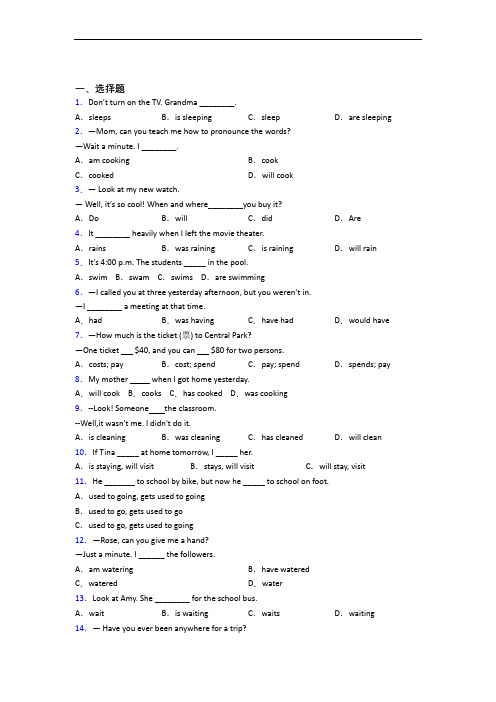
一、选择题1.Don’t turn on the TV. Grandma ________.A.sleeps B.is sleeping C.sleep D.are sleeping 2.—Mom, can you teach me how to pronounce the words?—Wait a minute. I ________.A.am cooking B.cookC.cooked D.will cook3.— Look at my new watch.—Well, it’s so cool! When and where________you buy it?A.Do B.will C.did D.Are4.It ________ heavily when I left the movie theater.A.rains B.was raining C.is raining D.will rain 5.It’s 4:00 p.m. The students _____ in the pool.A.swim B.swam C.swims D.are swimming6.—I called you at three yesterday afternoon, but you weren’t in.—I ________ a meeting at that time.A.had B.was having C.have had D.would have 7.—How much is the ticket (票) to Central Park?—One ticket $40, and you can $80 for two persons.A.costs; pay B.cost; spend C.pay; spend D.spends; pay 8.My mother when I got home yesterday.A.will cook B.cooks C.has cooked D.was cooking9.--Look! Someone the classroom.--Well,it wasn't me. I didn't do it.A.is cleaning B.was cleaning C.has cleaned D.will clean 10.If Tina _____ at home tomorrow, I _____ her.A.is staying, will visit B.stays, will visit C.will stay, visit 11.He _______ to school by bike, but now he _____ to school on foot.A.used to going, gets used to goingB.used to go, gets used to goC.used to go, gets used to going12.—Rose, can you give me a hand?—Just a minute. I ______ the followers.A.am watering B.have wateredC.watered D.water13.Look at Amy. She ________ for the school bus.A.wait B.is waiting C.waits D.waiting 14.— Have you ever been anywhere for a trip?— A trip? I ________ away from my hometown even once.A.went B.have gone C.have been D.have never been 15.The water ______ cool when I jumped into the pool for morning exercise.A.was felt B.is felt C.felt D.feels 16.While I_______ a detective story, someone_______ at the door.A.read, was knockingB.read, knockedC.was reading, knockedD.was reading, was knocking17.--What age did you leave home ?--I left home at 18. I ___your city for five yearsA.have gone to B.have been to C.have been in D.have come to 18.The film Operation Red Sea_____a lot of praise since its first show months ago. A.wins B.win C.will win D.has won 19.It’s 8 o’clock. The students _________ an English class.A.have B.having C.is having D.are having 20.—Did you hear the strange noise next door around 9 o’clock last night?— No, I ________my favourite film in my bedroom.A.watch B.watched C.am watching D.was watching 21.Don’t talk! The baby ________.A.sleeps B.is sleep C.sleeping D.is sleeping 22.— What do you use MP3 for?— I ________ it ________ to music.A.use; listen B.are listening; listeningC.use; to listen D.is listening; to listening23.My father was reading ________ I was sleeping.A.while B.when C.before D.after 24.Look! All my classmates ___________ on the playground.A.are running B.ran C.were running D.run25.—I can’t find Peter. Where is he?— He ______ tea in the living room.A.drinks B.drinking C.is drinking D.drink【参考答案】***试卷处理标记,请不要删除一、选择题1.B【解析】【分析】【详解】句意:别开电视,奶奶正在睡觉。
六年级重要知识点总结动词时态与语态解析

六年级重要知识点总结动词时态与语态解析六年级重要知识点总结:动词时态与语态解析动词时态和语态是英语语法中的重要知识点,对于学习英语的同学来说非常关键。
本文将对六年级学生必须掌握的动词时态和语态进行解析和总结。
动词时态时态是指动词在不同时间下的形式变化,主要包括一般现在时、一般过去时、一般将来时、现在进行时、过去进行时、将来进行时、现在完成时和过去完成时。
下面将逐个进行解析:一、一般现在时一般现在时表示现在的动作或状态,常常和时间状语词(如often, usually, sometimes等)一起使用。
常见的构成形式为主语+动词原形(第三人称单数需加s或es)。
例如:1. I eat breakfast every morning.2. He studies hard for the exam.二、一般过去时一般过去时表示过去发生的动作或状态,一般和表示过去的时间状语词(如yesterday, last week等)一起使用。
常见的构成形式为主语+动词过去式。
例如:1. She played soccer yesterday.2. We went to the park last Sunday.三、一般将来时一般将来时表示将来要发生的动作或状态,一般和表示将来的时间状语词(如tomorrow, next month等)一起使用。
常见的构成形式为主语+will+动词原形。
例如:1. They will visit their grandparents tomorrow.2. I will study for the test next week.四、现在进行时现在进行时表示现在正在进行的动作,常与现在进行时标志词(如now, at the moment等)一起使用。
常见的构成形式为主语+am/is/are+动词-ing形式。
例如:1. We are watching a movie now.2. She is playing the piano at the moment.五、过去进行时过去进行时表示过去某一时刻正在进行的动作,一般和过去进行时标志词(如at that time, at 3 o'clock等)一起使用。
动词时态的全面解析准确运用过去现在和将来时

动词时态的全面解析准确运用过去现在和将来时动词时态的全面解析及准确运用过去、现在和将来时动词时态是英语语法中的一个重要部分,它用来表达动作或状态发生的时间。
正确地运用时态可以使句子更加准确、流畅,并能够有效传达我们所要表达的意思。
本文将对动词时态进行全面解析,并指导如何准确运用过去时、现在时和将来时。
1. 过去时(Past Tense)过去时用于描述已经发生过的动作或状态。
一般过去时表示的是过去某个特定时间发生的动作,例如:I watched a movie last night.(昨晚我看了一部电影。
)He lived in London for five years.(他在伦敦生活了五年。
)除了一般过去时外,过去时还有以下几种形式:1.1 过去进行时(Past Continuous Tense)过去进行时表示过去某一时间正在进行的动作,或过去某一时间段内连续发生的动作,例如:I was watching a movie when she called me.(她给我打电话时,我正在看电影。
)They were playing basketball from 4 pm to 6 pm yesterday.(昨天从下午4点到6点,他们一直在打篮球。
)1.2 过去完成时(Past Perfect Tense)过去完成时表示在过去某个时间之前已经发生的动作,例如:She had already finished her homework before he arrived.(他到之前她已经完成了作业。
)They had known each other for ten years before they got married.(他们在结婚前已经认识了十年。
)1.3 过去完成进行时(Past Perfect Continuous Tense)过去完成进行时表示过去某一时间之前一直在进行的动作,例如:I had been waiting for two hours when the bus finally arrived.(公交车最终到达时,我已经等了两个小时了。
高考英语动词的时态和语态语法知识点与技巧方法
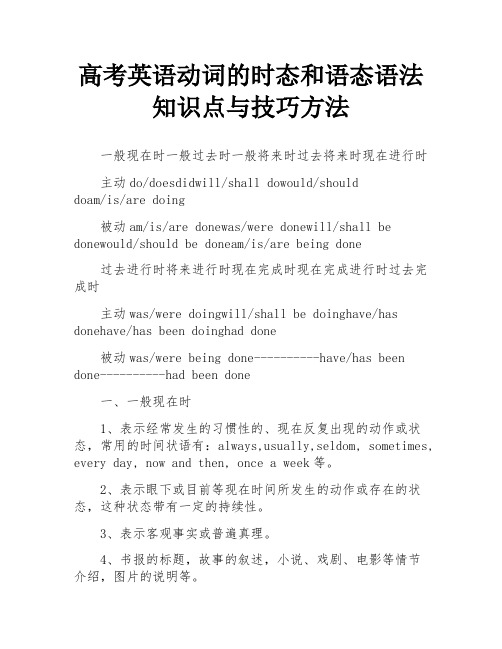
高考英语动词的时态和语态语法知识点与技巧方法一般现在时一般过去时一般将来时过去将来时现在进行时主动do/doesdidwill/shall dowould/shoulddoam/is/are doing被动am/is/are donewas/were donewill/shall be donewould/should be doneam/is/are being done过去进行时将来进行时现在完成时现在完成进行时过去完成时主动was/were doingwill/shall be doinghave/has donehave/has been doinghad done被动was/were being done----------have/has been done----------had been done一、一般现在时1、表示经常发生的习惯性的、现在反复出现的动作或状态,常用的时间状语有:always,usually,seldom, sometimes, every day, now and then, once a week等。
2、表示眼下或目前等现在时间所发生的动作或存在的状态,这种状态带有一定的持续性。
3、表示客观事实或普遍真理。
4、书报的标题,故事的叙述,小说、戏剧、电影等情节介绍,图片的说明等。
5、时间表、时刻表、日程表、节目单、课程表等按规定将要发生的动作,只限于go, arrive, leave, start, stay, return, begin, e等动词。
6、在时间、条件、方式、让步状语从句中,表示将来的动作。
注意:一般现在时可以用于定语从句或宾语从句中表示将来。
7、用在某些表达中,表示现在正在发生的动作或存在的状态。
Here es the bus!How it rains!二、一般过去时1、表示在过去某一时间点发生的动作或所处的状态,与现在没有关系。
常用的时间状语有:yesterday, last night, at that time等。
中考语法知识点归纳动词时态语态与非谓语动词
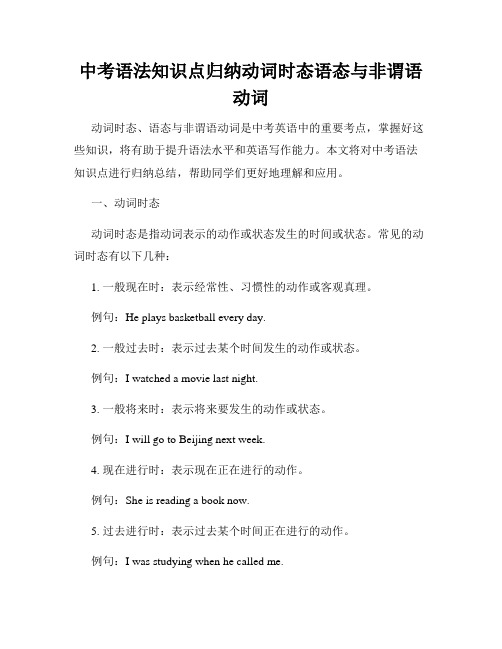
中考语法知识点归纳动词时态语态与非谓语动词动词时态、语态与非谓语动词是中考英语中的重要考点,掌握好这些知识,将有助于提升语法水平和英语写作能力。
本文将对中考语法知识点进行归纳总结,帮助同学们更好地理解和应用。
一、动词时态动词时态是指动词表示的动作或状态发生的时间或状态。
常见的动词时态有以下几种:1. 一般现在时:表示经常性、习惯性的动作或客观真理。
例句:He plays basketball every day.2. 一般过去时:表示过去某个时间发生的动作或状态。
例句:I watched a movie last night.3. 一般将来时:表示将来要发生的动作或状态。
例句:I will go to Beijing next week.4. 现在进行时:表示现在正在进行的动作。
例句:She is reading a book now.5. 过去进行时:表示过去某个时间正在进行的动作。
例句:I was studying when he called me.6. 现在完成时:表示过去的动作对现在造成的影响或结果。
例句:She has visited Paris three times.7. 过去完成时:表示对过去某个时间之前发生的动作进行的描述。
例句:They had already left when I arrived.二、动词语态动词语态是指动作发出的主体和动作所受的影响关系。
英语中常见的动词语态有以下几种:1. 主动语态:表示主语是动作的发出者。
例句:He fixed the car yesterday.2. 被动语态:表示主语是动作的承受者。
例句:The car was fixed by him yesterday.3. 进行时态:表示主语正在进行的动作处于进行状态。
例句:The book is being read by her.4. 完成时态:表示主语已经完成的动作处于完成状态。
例句:The book has been read by her.注意:被动语态需要根据动作的时态来变换,同时需要适当更改时态动词。
高中英语必修课----复习动词时态知识讲解及巩固练习题(含答案解析)
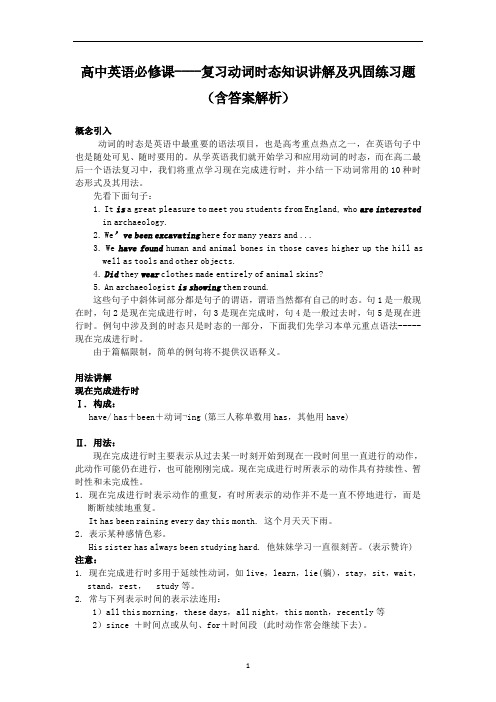
高中英语必修课----复习动词时态知识讲解及巩固练习题(含答案解析)概念引入动词的时态是英语中最重要的语法项目,也是高考重点热点之一,在英语句子中也是随处可见、随时要用的。
从学英语我们就开始学习和应用动词的时态,而在高二最后一个语法复习中,我们将重点学习现在完成进行时,并小结一下动词常用的10种时态形式及其用法。
先看下面句子:1.It is a great pleasure to meet you students from England,who are interestedin archaeology.2.We’ve been excavating here for many years and...3.We have found human and animal bones in those caves higher up the hill aswell as tools and other objects.4.Did they wear clothes made entirely of animal skins?5.An archaeologist is showing them round.这些句子中斜体词部分都是句子的谓语,谓语当然都有自己的时态。
句1是一般现在时,句2是现在完成进行时,句3是现在完成时,句4是一般过去时,句5是现在进行时。
例句中涉及到的时态只是时态的一部分,下面我们先学习本单元重点语法-----现在完成进行时。
由于篇幅限制,简单的例句将不提供汉语释义。
用法讲解现在完成进行时Ⅰ.构成:have/has+been+动词¬ing(第三人称单数用has,其他用have)Ⅱ.用法:现在完成进行时主要表示从过去某一时刻开始到现在一段时间里一直进行的动作,此动作可能仍在进行,也可能刚刚完成。
现在完成进行时所表示的动作具有持续性、暂时性和未完成性。
1.现在完成进行时表示动作的重复,有时所表示的动作并不是一直不停地进行,而是断断续续地重复。
英语动词时态及用法详解

英语动词时态及用法详解英语动词时态是英语语法中的重要组成部分,它能够帮助我们准确地表达动作发生的时间和状态。
在这篇文章中,我们将详细探讨英语中常见的动词时态及其用法。
一、一般现在时一般现在时表示经常发生的动作、习惯性的行为、客观真理或普遍存在的情况。
其构成是主语+动词原形(当主语是第三人称单数时,动词要加“s”或“es”)。
例如:“I go to school every day”(我每天上学。
)“He likes playing football”(他喜欢踢足球。
)一般现在时常用于以下情况:1、表示日常习惯和规律,如“He gets up early every morning”(他每天早上都早起。
)2、表示客观事实和真理,例如“The earth moves around the sun”(地球绕着太阳转。
)3、表示永恒的状态,“Water boils at 100 degrees Celsius”(水在 100 摄氏度沸腾。
)二、一般过去时一般过去时表示过去某个时间发生的动作或存在的状态。
其构成是主语+动词的过去式。
比如:“I saw a movie yesterday”(我昨天看了一场电影。
)“She was happy last week”(她上周很开心。
)一般过去时的使用场景通常有:1、描述过去发生的一次性动作,“I met her at the party last night”(昨晚在派对上我遇见了她。
)2、讲述过去的习惯或状态,“When I was a child, I often played in the park”(当我还是个孩子的时候,我经常在公园玩。
)三、一般将来时一般将来时表示将来要发生的动作或存在的状态。
常见的构成方式有“will +动词原形”和“be going to +动词原形”。
像:“I will visit my grandparents next weekend”(下个周末我将去看望我的祖父母。
(必考题)初中英语常用语法知识——动词时态知识点复习(答案解析)

一、选择题1.________he_______big________?A.Does; has; foot B.Does; have; feet C.Do; have; foots B解析:B【解析】【分析】【详解】句意:他的脚大吗?考查一般疑问句和名词复数。
根据选项以及主语是he(第三人称单数),可知第一个空格要用does来提问;根据does是助动词,其后要跟动词原形,根据这一点,可排除答案A。
结合题意和选项,可知句子说的意思是:他的脚大吗?这里的脚,肯定是两只脚,故用复数。
foot的复数形式是feet。
故选B。
2.Ted likes Art, his brother .A.but; isn't B.and; don't C.but; doesn't D.but ;don't C解析:C【解析】【详解】句意:Ted喜欢美术,但是他的兄弟不喜欢。
考查连词及助动词。
but但是,表转折;and和,表并列;isn’t不是;don’t不;doesn’t 不,根据语境可知,第一个空应该是转折关系,排除B,由likes是实义动词,否定形式用助动词,排除A,his brother是第三人称单数,所以应该用doesn’t,排除D,故选C。
3.I don’t have a baseball, but AlanA.do B.does C.have D.has B解析:B【解析】【详解】句意:我没有棒球,但是Alan有。
考查助动词。
do做,实意动词;也可以作助动词;does是do的第三人称单数形式;have 有,实意动词;has有,是have的第三人称单数形式。
句子的主语是Alan,第三人称单数形式,故先排除A和C。
does为助动词,代指上句话中的“have”。
D选项中has是及物动词,后面缺少宾语。
故选B。
4.— ________ your cousin and her friends like history?—Yes, they ________ it’s very intere sting.A.Does; think B.Do ; think C.Do; thinks B解析:B【解析】【详解】句意:——你表妹和她的朋友们喜欢历史吗?——是的,他们认为它很有趣。
动词时态及语态的用法解析

动词时态及语态的用法解析动词时态是用来表示动作或状态发生的时间的,而语态则是表示主语与动作或状态之间的关系。
正确的使用动词时态和语态能够准确地表达出所要传达的意思。
本文将对动词时态及语态的用法进行解析,以帮助读者更好地理解和运用这些语法知识。
一、动词时态的用法1. 现在时态(Present Tense)现在时态表示目前正在进行或经常发生的动作。
它有以下几种形式:a) 一般现在时:用于表示客观事实、经常发生的动作或现在的状态。
例如:I live in Beijing.(我住在北京。
)b) 现在进行时:用于表示现在正在进行的动作。
例如:She is studying in the library.(她正在图书馆学习。
)c) 现在完成时:用于表示过去发生的动作对现在产生的影响或结果。
例如:I have finished my homework.(我已经完成作业了。
)2. 过去时态(Past Tense)过去时态表示过去发生的动作或状态。
它的常见形式如下:a) 一般过去时:用于表示过去发生的某个动作或状态。
例如:We went to the beach last summer.(我们上个夏天去了海滩。
)b) 过去进行时:用于表示过去某个时间段内正在进行的动作。
例如:She was playing the piano when I arrived.(我到达时她正在弹钢琴。
)c) 过去完成时:用于表示过去某个时间之前已经完成的动作或状态。
例如:They had already left when I got there.(我到达时他们已经离开了。
)3. 将来时态(Future Tense)将来时态表示将来发生的动作或状态。
它一般有以下几种形式:a) 一般将来时:用于表示将来某个时间发生的动作或状态。
例如:I will visit my grandparents next week.(下周我要去看望我的祖父母。
中考英语语法动词的时态复习讲义及总结与整理
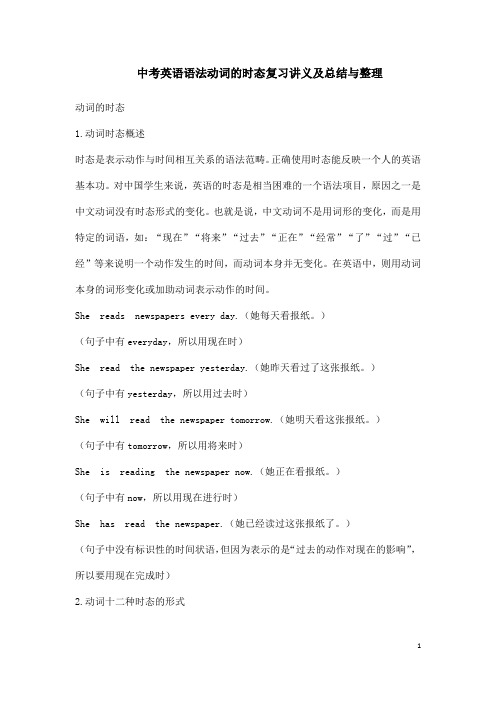
中考英语语法动词的时态复习讲义及总结与整理动词的时态1.动词时态概述时态是表示动作与时间相互关系的语法范畴。
正确使用时态能反映一个人的英语基本功。
对中国学生来说,英语的时态是相当困难的一个语法项目,原因之一是中文动词没有时态形式的变化。
也就是说,中文动词不是用词形的变化,而是用特定的词语,如:“现在”“将来”“过去”“正在”“经常”“了”“过”“已经”等来说明一个动作发生的时间,而动词本身并无变化。
在英语中,则用动词本身的词形变化或加助动词表示动作的时间。
She reads newspapers every day.(她每天看报纸。
)(句子中有everyday,所以用现在时)She read the newspaper yesterday.(她昨天看过了这张报纸。
)(句子中有yesterday,所以用过去时)She will read the newspaper tomorrow.(她明天看这张报纸。
)(句子中有tomorrow,所以用将来时)She is reading the newspaper now.(她正在看报纸。
)(句子中有now,所以用现在进行时)She has read the newspaper.(她已经读过这张报纸了。
)(句子中没有标识性的时间状语,但因为表示的是“过去的动作对现在的影响”,所以要用现在完成时)2.动词十二种时态的形式英语动词共有十六种时态,一般语法书列出的英语动词的十二种时态为“现在”“过去”和“将来”三大类;每类中又分为“一般”“进行”“完成”“完成进行”四种,共十二种,下面以study为例,列表说明。
注意:初中阶段最常用的时态有5种,即一般现在时、一般过去时、现在进行时、一般将来时和现在完成时。
在下面的文章中,将分别讲述各种时态的具体用法。
不规则动词变化表例题:( )1. —When did you meet him? —While I ____ on the street.A. walksB. walkC. was walkingD. am walking( )2. —Mum, why don't you go to sleep? —Your sister ____ yet. I ____ for her.A. hasn't come back; am waitingB. didn't come back; was waitingC. hadn't come back; was waitingD. came back; waited( )3. —King White ___ in our company for 20 years.—Yes, and she ___ here when she was 21 years old.A. has worked; has comeB. worked; comesC. worked; cameD. has worked; came( )4. —Don't forget to visit me when you come here.—OK. I ___ you a call as soon as I ____ there.A. gave; getB. will give; will getC. give; will getD. will give; get( )5. —What did you do last summer vacation?—Don't mention it. I ____ always ____ my parents on the farm.A. was; helpingB. / ; helpedC. would; helpD. have; helped( )6. —Would you like to see the movie? —No, thanks.I ____ it twice.A. have seenB. seenC. sawD. had seen( )7. —Are you still single? —No, I ____ for two months.A. have been marriedB. have marriedC. was marryingD. married( )8. —We will do some cleaning if the weather ___ fine tomorrow.—But I think it ____ rain.A. will be; is going toB. is; is going toC. is; hasD. will be; has( )9. —Mike is preparing his luggage. —Yes. He _____ for Canada on vacation.A. leavesB. leftC. is leavingD. has been away( )10. —Be quiet. Dad ___ in the next room. —Sorry.A. sleepsB. sleptC. is sleepingD. was sleeping参考答案:1-5 CADDA 6-10 AABCC。
动词的各种时态归纳(含例句及解析)
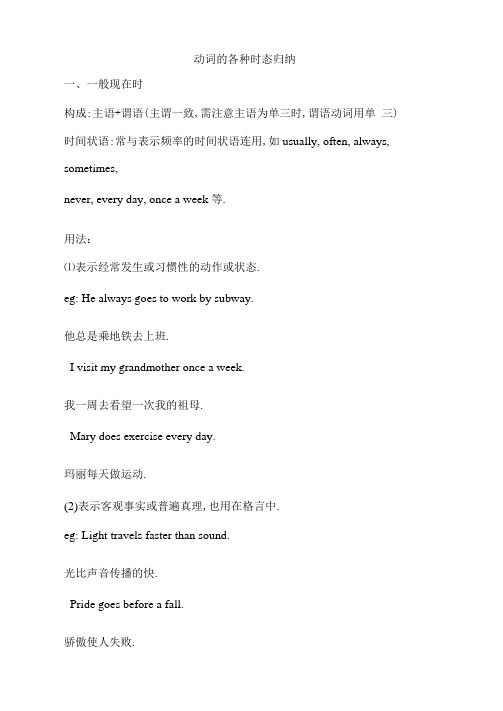
动词的各种时态归纳一、一般现在时构成:主语+谓语(主谓一致,需注意主语为单三时,谓语动词用单三) 时间状语:常与表示频率的时间状语连用,如usually, often, always, sometimes,never, every day, once a week 等.用法:⑴表示经常发生或习惯性的动作或状态.eg: He always goes to work by subway.他总是乘地铁去上班.I visit my grandmother once a week.我一周去看望一次我的祖母.Mary does exercise every day.玛丽每天做运动.(2)表示客观事实或普遍真理,也用在格言中.eg: Light travels faster than sound.光比声音传播的快.Pride goes before a fall.骄傲使人失败.⑶表示按方案或时间表将要发生的事儿,其后常跟表示将来的时间状语. The plane takes off at four PM.飞机下午4点起飞.When does the school begin?学校什么时候开学?(4)表示主语现在的特征性格或状态.Jenny loves music.珍妮喜欢音乐.She lives in a small apartment.他住在一套小公寓里.(5)一些表示心理意识的动词,如know, understand, remember等无进行时,只能用一般现在时表示现在发生的具体行为.eg: I still remember the frightening experience on the island.我仍然记得在那个岛上的可怕经历.⑹在时间和条件状语从句中代替一般将来时.eg: I'll think about it when I write my report.我写报告时会对此予以考虑的.If he comes, I'll let you know as soon as possible.如果他来的话,我会尽快让你知道.二、现在进行时构成:主iu+be+doing时间状语:常与now, right now, at present, at the moment 等时间状语及look, listen等标志词连用.用法:⑴表示说话时正在进行的动作.eg: We are waiting for the subway at the moment.我们现在正在等地铁.Listen! Somebody is singing.听!有人在唱歌.⑵表示现阶段正在进行,而此刻不一定在进行的动作.成语表示一段时间的状语连用,如these days, this week等.eg: How are you getting on with your classmates these days?这些天你和同班同学相处的如何?We are studying French this semester.我们这学期学习语法.⑶某些非延续性动词可以用现在进行时表示即将发生的动作.常用的这类动词有come, go, leave, arrive, start, finish, die 等.这时剧中一般有表示将来的时间状语.eg: They are living by train tonight.他们今晚坐火车走.We are starting work at 8 o'clock next month.下个月我们将8点开始上班.(4)表达特定的感情色彩.现在进行时常与always, continually, constantly, forever等表示频率的副词连用,表示重复的动作,常含有厌烦,不满,抱怨,赞扬等感情色彩.试比拟:She is always scolding her child.她总是训斥自己的孩子.〔不满〕She always scolds her children.他总是训斥自己的孩子.〔事实〕He is constantly doing good work at school.他在学校总是成绩优秀.〔赞扬〕He does good work at school.他在学校成绩优秀.〔事实〕三、现在完成时构成:主语+ha ve/has+done标志词:常与already, just, yet, before, recently, so far, ever, never, once 等连用.用法:⑴表示过去发生的动作,对现在造成的影响或结果.eg: They have already learned two languages.他们己经学会了两种语言.He hasn't made a remark on the structure yet.他尚未对该结构发表评论.I have seen the linguist only once this year.我今年只见过那位语言学家一次.⑵表示从过去某一时间开始持续到现在的动作或状态.常与表示一段时间的状语连用,如so far, up to now, for a long time, for years, since 2021, in the past/ last five years, these days 等. eg: Tom and mary have been friends for years.汤姆和玛丽是多年的朋友.He has lived in London since 2000.自从2000年以来他就住在伦敦.How many words have you learned these days?这些天你学会了多少单词?⑶在时间和条件状语从句中代替将来完成时.eg: I will go to the party as soon as I have finished my homework.我一完成作业就去参加聚会.I will not believe you unless I have seen it with my own eyes.除非亲眼看到,否那么我是不会相信你的.(4)在This/ It is the first /second time that 句式中,that 从句用现在完成时. eg: It's the first time that I have come to Harvard University.这是我第1次来哈佛大学.四、一般过去时构成:主语+动词过去式时间状语:yesterday, last..., ...ago, in+过去年份等.用法:(1)表示过去某个特定时间发生的动作或存在的状态.eg: He offered his seat to an old man.他把他的座位让给了一位老人.He had a nice encounter with that girl last week.上周我与那个女孩有一次美丽的邂逅.⑵表示过去某一段时间内经常性或习惯性的动作.eg: When I was a teenager, I played table tennis almost every day.我十几岁时几乎每天都打乒乓球.⑶在时间和条件状语从句中代替过去将来时.eg: They said they would let us know if they heard any news about him.他们说如果听到关于他的任何消息,他们就会通知我们.五、一般将来时构成:主语+shall/will+动词原形时间状语:常与tomorrow, next week, in the future, in a few days等时间状语连用.用法:表示将要发生的动作或存在的状态.eg: I shall leave for London tomorrow.我明天要去伦敦.A simple test will show if this is real gold.一个简单的测试将会证实这是不是真金.其他表达方式:(1)be going to do表示打算方案安排要做某事,或有迹象说明要发生某事.eg: What are you going to do during the summer holiday?暑假你打算做什么?Look at the dark clouds! It's going to rain.瞧那些乌云!就要下雨了.(2)be about to do表示即将发生的动作,一般不与具体的时间状语连用.eg: Be quiet! The lecture is about to start.安静!讲座马上就要开始了.⑶ be to do表示根据约定责任义务或要求等即将发生的动作. eg: We are to meet at the school gate.我们约好在校门口见.。
- 1、下载文档前请自行甄别文档内容的完整性,平台不提供额外的编辑、内容补充、找答案等附加服务。
- 2、"仅部分预览"的文档,不可在线预览部分如存在完整性等问题,可反馈申请退款(可完整预览的文档不适用该条件!)。
- 3、如文档侵犯您的权益,请联系客服反馈,我们会尽快为您处理(人工客服工作时间:9:00-18:30)。
一、选择题1.They the English role play for the show last night.A.will practice B.practiced C.is practicing D.have practiced2.—Look, Tom's parents look so sad.—Maybe they what's happened.A.knew B.have known C.has known D.will know 3.We’re not sure _______ there’ll be _______ or not tomorrow.A.if; rains B.if; rainy C.whether; raining D.whether; rain 4.Miss Brown, we ______ cleaning our classroom. Can we go home now?A.finish B.finishingC.are finished D.have finished5.No noise, please. Your brother ________ his homework in the next room.A.does B.is doing C.did D.has done6.Which of the following is right?A.He is used to live there.B.My main job is spreading the message about protecting the environment.C.I have borrowed the book from the library for two weeks.D.Kids under 18 are not allowed to drive.7.I like this dress very much. It soft and smooth.A.feels B.touches C.is felt D.is touched 8.My mother will be very angry with me when she out where I have been.A.finds B.found C.will find D.has found 9.—I called you at three yesterday afternoon, but you weren’t in.—I ________ a meeting at that time.A.had B.was having C.have had D.would have 10.—I'm sorry. There was too much traffic on the road.—Never mind. The meeting________for only 5 minutes.A.has begun B.has stopped C.has been on 11.Alice always________her notebooks. She is not tidy.A.lose B.lost C.loses D.found 12.—How long have you________?—For 10 years, we got married in 2005.A.married B.got married C.been married D.were married 13.Miss Smith in our school since five years ago.A.teaches B.taught C.has taught D.is teaching14.—I can’t stand such loud music!— Sorry, I __________ it off.A.have turned B.turn C.turned D.will turn15.— Could you please tell me yesterday?— In the bookshop nearby.A.Where you bought the book B.Where you buy the bookC.Where did you buy the book D.Where do you buy the book16.Look! The boy________ the flowers in the garden. He________the flower to grow fast. A.waters, wants B.is watering, wantsC.watered, is wanting D.is watering, is wanting17.Look! Dave __________ on the phone.A.talks B.are talking C.talk D.is talking 18.He to the zoo yesterday.A.goes B.go C.goed D.went 19.—Remember the first time we met, Jim?—Of course I do. You ________ in the library.A.were reading B.have read C.will read D.read20.Mr. Smith ______ our school next year.A.will visit B.visits C.was visiting D.visited21.—Did you hear the strange noise ne xt door around 9 o’clock last night?— No, I ________my favourite film in my bedroom.A.watch B.watched C.am watching D.was watching 22.—How did the accident happen?—You know, it was difficult to see the road clearly because it________.A.was raining B.has rained C.is raining D.will rain 23.—Do you still play the piano?—Oh, no. I ________it since last year.A.didn’t play B.haven’t played C.don’t play24.My father is a teacher and he ___________ in this school for about twenty years. A.works B.is working C.was working D.has worked 25.—How much is the ticket (票) to Central Park?—One ticket $40, and you can $80 for two persons.A.costs; pay B.cost; spend C.pay; spend D.spends; pay【参考答案】***试卷处理标记,请不要删除一、选择题1.B解析:B【解析】句意:昨天晚上为了演出他们练习了英语角色扮演。
考查一般过去时。
根据提示词last night可知时态用一般过去时,“练习”practice,其过去式为practiced,故答案选B。
2.B解析:B【解析】【分析】【详解】句意:——看,汤姆的父母看起来很伤心。
——或许他们已经知道发生了什么事。
考查现在完成时。
A. knew一般过去时;B. have known 现在完成时我;C. has known现在完成时;D. will know一般将来时。
根据句意“——看,汤姆的父母看起来很伤心。
——或许他们已经知道发生了什么事。
”可知know的动作发生在过去,对现在造成一定的影响,故时态用现在完成时,其构成为:have/has+动词的过去分词,主语是they,助动词用have,know的过去分词是known;故答案选B。
3.D解析:D【解析】句意:我们不确定明天是否会下雨。
考查连词辨析和动词时态辨析。
if和whether表示“是否”可换用,但和or not连用时需用whether,可排除AB两项。
tomorrow用于一般将来时,be raining是进行时结构,可排除。
根据句意结构,可知选D。
4.D解析:D【解析】试题分析:句意:布朗夫人,我们已经打扫完了教室,我们现在可以回家了吗?finish完成;finishing现在分词形式;are finished被完成,被动语态形式;have finished现在完成时,已经完成。
根据句意可知,我们已经打扫完了,强调动作已经完成。
故应选D。
【考点定位】:考查动词时态。
5.B解析:B【解析】试题分析:句意:请不要大声喧哗。
你哥哥正在隔壁房间里写作业。
结合语境可知本句描述的是现在正在进行的动作,故用现在进行时态.。
请在此填写本题解析!故选B。
6.D解析:D【解析】【分析】【详解】句意:下列哪个选项是正确的?A项He is used to live there.句中be used to 表示习惯做某事,后接doing,原句中live是动词原形,应填living,故A错误,正确为He is used to living there;B项中My main job is spreading the massage about protecting the environment.本句为主系表结构,表语应该为动词不定式形式,不应该用动名词形式,正确为My main job is to spread the message about protecting the environment.故B项错误。
C项I have borrowed the book from the library for two weeks. 句中有时间状语for two weeks,故用现在完成时态,谓语动词为borrowed,是非延续性动词,不能与一段时间连用,应该用kept,故正确为I have kept the book from the library for two weeks. 故C项错误。
